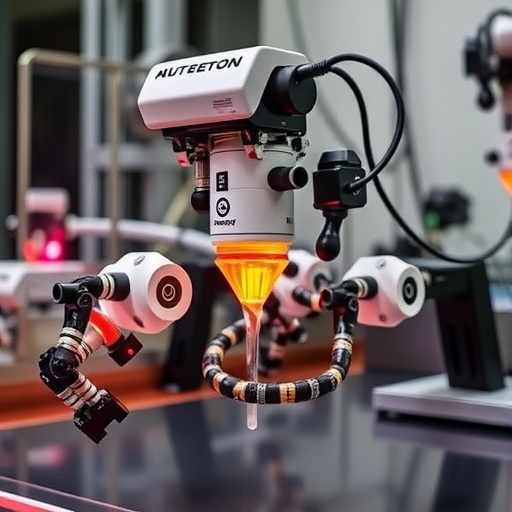In the relentless pursuit of advanced materials tailored for specific applications, the intersection of artificial intelligence and experimental science has emerged as a transformative frontier. While computational insights and automated synthesis have propelled materials science forward, real-world experimentation remains largely tethered to traditional, unimodal approaches. These conventional methods predominantly leverage a single data stream, limiting the ability to unravel the intricate complexities inherent in materials design and performance optimization. The scientific community has long recognized the immense potential of AI to bridge this gap, yet fully harnessing its capabilities in experimental contexts has remained elusive—until now.
A groundbreaking development arrives in the form of CRESt, or Copilot for Real-world Experimental Scientists, a novel platform designed to revolutionize materials discovery through an unprecedented integration of large multimodal models (LMMs), knowledge-assisted Bayesian optimization, and robotic automation. CRESt represents a significant leap forward, merging data from diverse sources—chemical compositions, text embeddings, and microstructural images—into a coherent, intelligent framework that can accelerate and refine the materials design process with remarkable efficiency.
Central to CRESt’s innovation is its utilization of LMMs capable of interpreting and synthesizing vast, heterogeneous data types that traditionally remain siloed. By embedding chemical information alongside imagery and domain-specific textual knowledge, these models construct a rich, multidimensional understanding of material systems. This capability enables CRESt not merely to predict promising catalyst formulations but also to anticipate how microscopic structural nuances influence macroscopic performance, a feat beyond the reach of unimodal algorithms.
Layered atop this multimodal intelligence is Knowledge-Assisted Bayesian Optimization (KABO), a strategic algorithm that guides experimental exploration by balancing the dual imperatives of exploitation and discovery. KABO leverages embedded chemical knowledge to prune the otherwise intractably large search space, homing in on regions most likely to yield breakthroughs. This strategic focus mitigates wasted resources and accelerates convergence toward superior materials, embodying a paradigm shift in experimental design philosophy.
Furthermore, CRESt’s integration with advanced robotic synthesis and characterization platforms is pivotal. Automated high-throughput experimentation generates an unprecedented volume of reliable data, feeding back into the LMM and optimisation loops in real time. This rapid, iterative cycle transforms traditional materials development into an agile, closed-loop system that continuously learns and adapts, significantly shortening the timeline from hypothesis to functional discovery.
A notable feature of CRESt is its capacity for autonomous anomaly detection and hypothesis generation through vision-language models. By utilizing camera monitoring, the system discerns subtle experimental deviations—whether in synthesis conditions or emergent material properties—and formulates corrective strategies on its own. Such adaptive oversight not only safeguards data integrity but also enhances experimental robustness, reducing human intervention and error.
The efficacy of CRESt was demonstrated in the challenging domain of electrochemical formate oxidation, a process critical for sustainable chemical energy conversion. Over a mere three months, the platform executed more than 3,500 electrochemical tests across an expansive octonary catalyst chemical space comprising Pd, Pt, Cu, Au, Ir, Ce, Nb, and Cr. This rapid, large-scale exploration unearthed a state-of-the-art catalyst exhibiting a striking 9.3-fold improvement in cost-specific performance compared to existing materials.
This breakthrough underscores CRESt’s transformative potential not only in accelerating discovery but in identifying multi-element catalysts whose complex compositional synergies are notoriously difficult to predict or optimize through human intuition alone. By automating the synthesis, characterization, and analysis pipeline, CRESt unlocks a new horizon in catalysis research that balances sophistication with speed.
The broader implications for materials science are profound. CRESt’s framework suggests a future where experimental laboratories operate as intelligent ecosystems, with AI-driven platforms autonomously steering research directions, adapting protocols, and unveiling insights across multiple scientific domains. This evolution promises to democratize access to high-level materials innovation, enabling rapid prototyping for sectors as diverse as renewable energy, electronics, and pharmaceuticals.
Equally compelling is how CRESt epitomizes the convergence of artificial intelligence with practical, real-world science. It moves beyond theoretical or computational speculation, embedding intelligent systems into tangible experimentation processes. This synergy not only drives immediate discoveries but cultivates an agile feedback loop where human and machine intelligence co-evolve, propelling science into unprecedented territories.
As AI continues to permeate scientific disciplines, platforms like CRESt herald a new era wherein the barriers between computation, experimentation, and knowledge are dissolved. The insights gleaned here offer a blueprint for the integration of multimodal AI with experimental robotics, setting a standard for future initiatives aimed at tackling the complex, multi-variable challenges endemic to advanced materials design.
In sum, CRESt illuminates a path forward for AI-assisted materials innovation, demonstrating the profound advantages of integrating large multimodal models with knowledge-guided optimization and robotic automation. Its success in the electrochemical catalytic domain is both a validation and a harbinger of the transformative impact this technology promises for a gamut of scientific endeavors poised on the cusp of rapid discovery.
Subject of Research:
Not explicitly provided.
Article Title:
Not explicitly provided.
Article References:
Zhang, Z., Ren, Z., Hsu, CW. et al. A multimodal robotic platform for multi-element electrocatalyst discovery. Nature (2025). https://doi.org/10.1038/s41586-025-09640-5
Image Credits:
AI Generated




